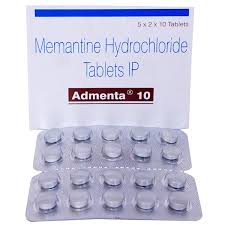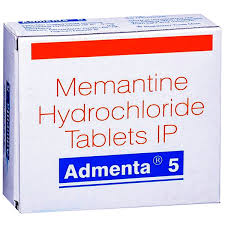Admenta 10 Tablet
- Flash Deals
- Deals Of The Day
- Popular Category
Overview
Product introduction
Admenta 10 Tablet is a medicine used in the treatment of Alzheimer's disease. It helps to slow down the progression of moderate to severe Alzheimer's disease by improving memory and thinking. This medicine works by blocking a chemical messenger involved in the transmission of nerve signals.
Admenta 10 Tablet maybe taken with or without food. However, it is advised to take it at the same time each day to maintain a consistent level of medicine in the blood. If you missed a dose, take it as soon as you remember. Do not skip any doses and finish the full course of treatment even if you feel better. It is important that this medication is not stopped suddenly without talking to your doctor.
The most common side effects of this medicine are dizziness, headache, confusion, and constipation. It may also cause dizziness and sleepiness, so do not drive or do anything that requires mental focus until you know how this medicine affects you.
Before taking this medicine, inform the doctor if you have a history of seizures, kidney disease, heart disease, or liver disease. Let your doctor also know if you are taking any other medicines for any medical conditions. Pregnant and breastfeeding women should consult their doctors before taking this medicine.
Benefits
Uses of Admenta Tablet
Benefits of Admenta Tablet
In Alzheimer's disease
Admenta 10 Tablet improves learning, memory and information processing (cognitive function) in people with moderate to severe Alzheimer's disease. These problems in memory and thinking may start interfering with daily activities and worsen your condition. This medicine will help in managing Alzheimer’s disease effectively. It will make it easier for you to carry out your daily activities and improve your quality of life. Do not stop taking it unless advised by the doctor. It can take several weeks for your symptoms to improve; so keep using the medicine even if you do not think it is working.
Side Effects
Side effects of Admenta Tablet
Most side effects do not require any medical attention and disappear as your body adjusts to the medicine. Consult your doctor if they persist or if you’re worried about them
Common side effects of Admenta
- Dizziness
- Headache
- Confusion
- Constipation
Safety Advice
Safety advice

Alcohol
CAUTION
Caution is advised when consuming alcohol with Admenta 10 Tablet. Please consult your doctor.

Pregnancy
SAFE IF PRESCRIBED
Admenta 10 Tablet is generally considered safe to use during pregnancy. Animal studies have shown low or no adverse effects to the developing baby; however, there are limited human studies.

Breast feeding
CONSULT YOUR DOCTOR
Information regarding the use of Admenta 10 Tablet during breastfeeding is not available. Please consult your doctor.

Driving
UNSAFE
Admenta 10 Tablet may cause side effects which could affect your ability to drive.

Kidney
CAUTION
Admenta 10 Tablet should be used with caution in patients with severe kidney disease. Dose adjustment of Admenta 10 Tablet may be needed. Please consult your doctor.

Liver
CAUTION
Admenta 10 Tablet should be used with caution in patients with severe liver disease. Dose adjustment of Admenta 10 Tablet may be needed. Please consult your doctor.
Limited information is available on the use of Admenta 10 Tablet in these patients. No dose adjustment is recommended in patients with mild to moderate liver disease.
How to use
How to use Admenta Tablet
Take this medicine in the dose and duration as advised by your doctor. Swallow it as a whole. Do not chew, crush or break it. Admenta 10 Tablet may be taken with or without food, but it is better to take it at a fixed time.
How Admenta Tablet works
Admenta 10 Tablet is an N-methyl-D-aspartate (NMDA) receptor antagonist. Memory loss in Alzheimer’s disease is due to excessive production of glutamate (chemical messenger) in the brain which is mediated by NMDA receptors. Admenta 10 Tablet works by preventing the action of NMDA receptors and regulates the production of glutamate. involved in the transmission of nerve signals. This is how it prevents memory loss in Alzheimer’s disease.
Substitute
-
Name
-




